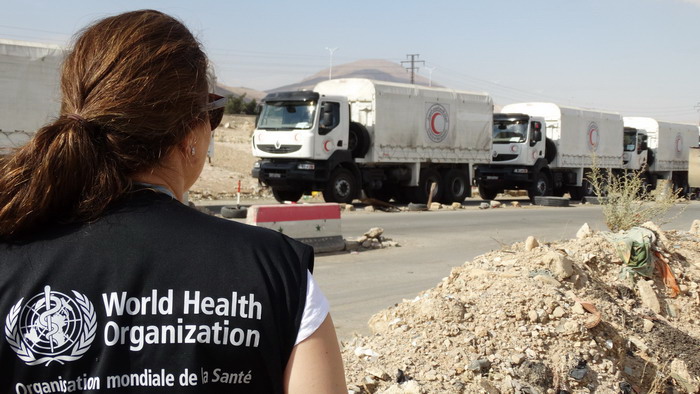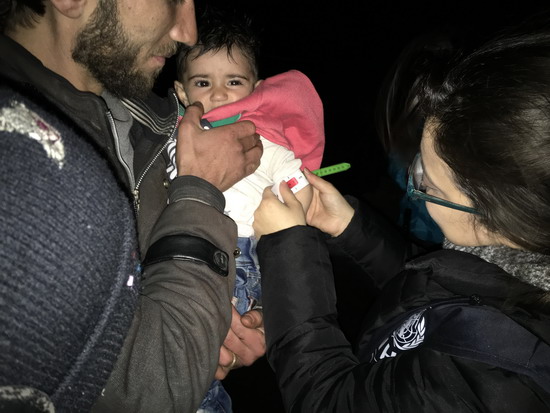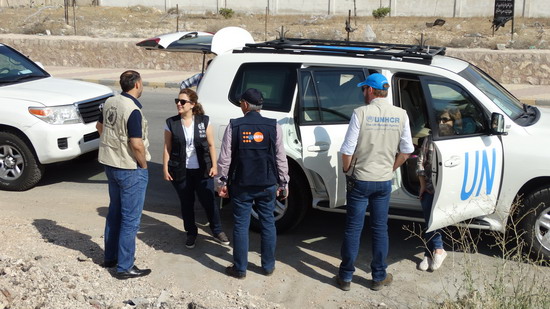 Hala contributed to the development of contingency and response plans covering areas such as the evacuations from eastern Aleppo, mass displacement in northeast Syria
Hala contributed to the development of contingency and response plans covering areas such as the evacuations from eastern Aleppo, mass displacement in northeast Syria
Cairo, 8 April 2019 — “When I see the vast number of people trapped in emergency countries in our Region, including children who are severely malnourished, I am more determined to keep doing whatever I can to help save their lives,” says Hala Khudari, technical officer in the WHO Regional Office's health emergencies programme.
Hala joined the WHO country office in Syria a few months after receiving her Masters of Science in Nutrition from the American University of Beirut in 2011. There, she managed regular and emergency nutrition activities. And with the onset of the crisis, she has been fully engaged in supporting WHO’s emergency response operations, with a focus on nutrition. Despite the considerable pressure of work and some “dark moments” she says she has faced, especially while working at field level and near the frontlines, Hala maintains an unending passion for working in emergencies.
 Since the day she joined WHO Syria in 2011, Hala Khudari has been fully engaged in supporting WHO’s emergency response operations, with a focus on nutrition
Since the day she joined WHO Syria in 2011, Hala Khudari has been fully engaged in supporting WHO’s emergency response operations, with a focus on nutrition
“At first, I found working in a crisis setting and visiting war-torn areas quite stressful. I saw many malnourished children in Syria, some of whom require immediate medical attention. I also had to overcome a lot of challenges, including lack of access, denied approvals, insecurity and other dire situations. But I put all my energy into my work,” she says.
During her time with WHO Syria, Hala played a key role in planning and responding to the health and nutrition needs of Syrians across the country. She also contributed to the development of contingency and response plans, covering areas such as the evacuations from eastern Aleppo, mass displacement in northeast Syria, and WHO’s response in besieged and hard-to-reach areas.
 Hala contributed to the development of contingency and response plans covering areas such as the evacuations from eastern Aleppo, mass displacement in northeast Syria
Hala contributed to the development of contingency and response plans covering areas such as the evacuations from eastern Aleppo, mass displacement in northeast Syria
In November 2017, Hala joined the health emergencies team in the Regional Office for the Eastern Mediterranean to support WHO’s work across the Region. “This opportunity enabled me to widen my horizons and provide similar support to other emergency countries, including Iraq and Sudan.” she said.
More recently, Hala has been actively engaged in supporting WHO’s health response in northeast Syria, an area devastated by 8 years of conflict, with hundreds of thousands of people in acute need of humanitarian assistance, including tens of thousands of displaced people living in dire conditions in camps and settlements.
“The regional experience I obtained in the last 17 months, combined with my previous country-level experience, has provided me with a more complex understanding of the pressing health and nutrition needs influencing countries in emergencies, and the required flexibility and coordination required to respond.
“Working in emergencies has shed light on the increasing concern of acute malnutrition resulting from protracted emergencies across the region. As a nutritionist by training, I am alarmed by the numbers of cases requiring treatment in countries such as Somalia, Sudan and Yemen. While there are tremendous efforts by different agencies and sectors to mitigate and manage acute malnutrition, it is not sufficient, and in some cases it is getting worse. The only way to improve the situation is to get all related stakeholders join forces and work together, otherwise our Region will be in deep trouble.
“As long as I am in the field and in touch with the people in need, I will do everything in my power to help those suffering and the most vulnerable.”
“I regain perspective of the United Nations’s humanitarian principles, and remember why I chose to work in the humanitarian sector in the first place,” Hala said.








